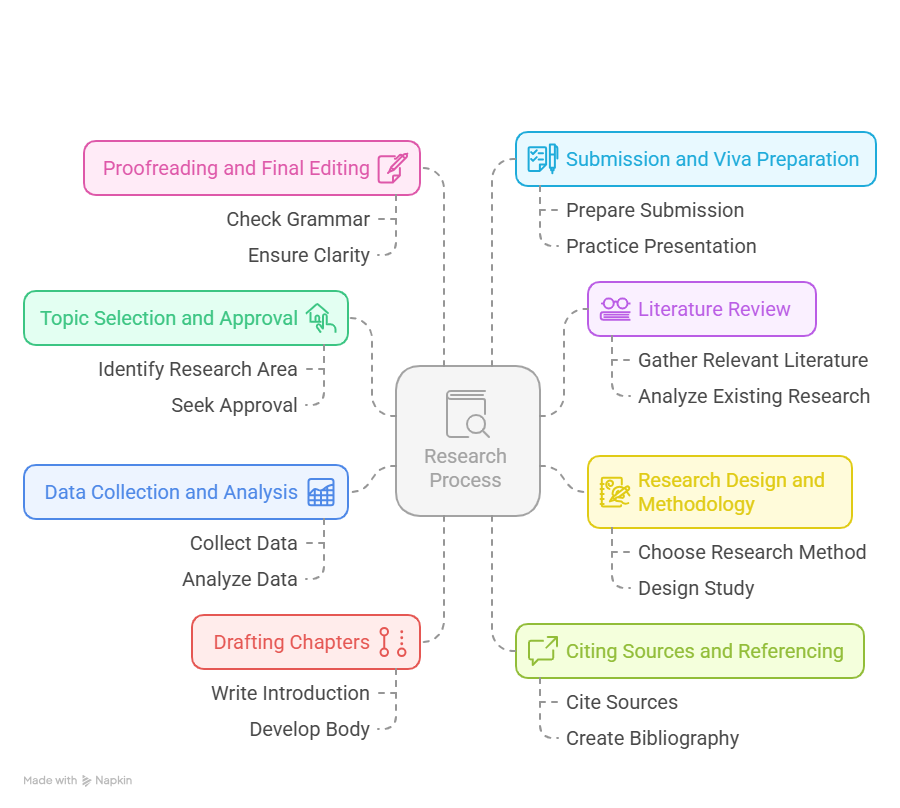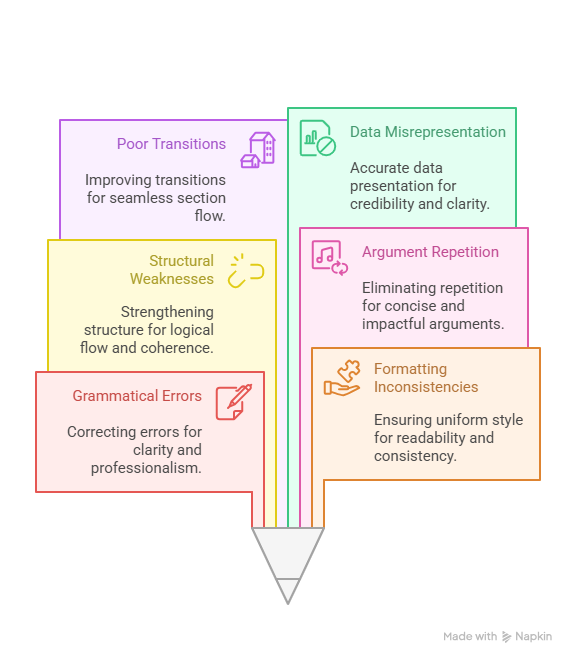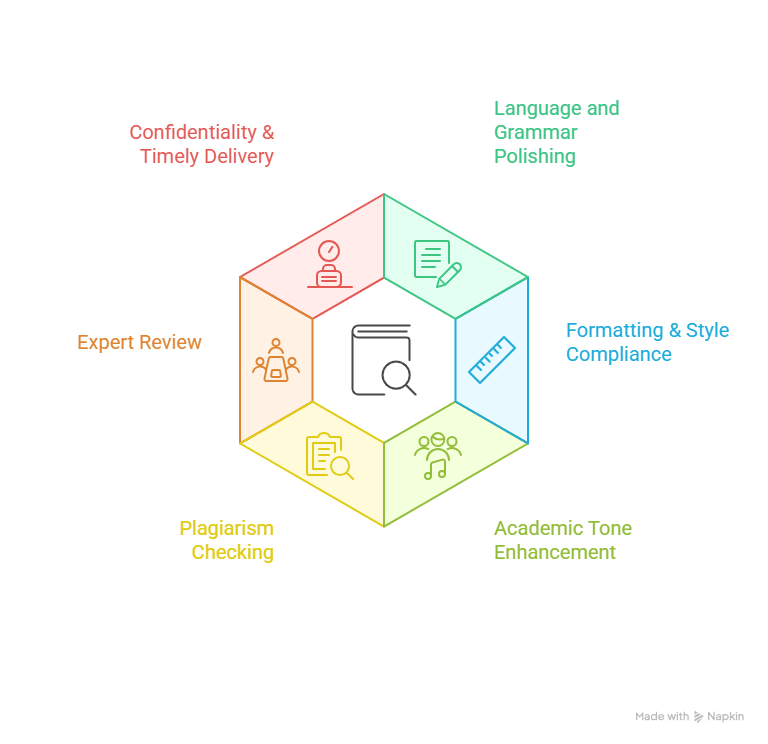Completing your PhD thesis is a remarkable achievement—but your journey doesn’t end with the final chapter. Before submission, your document must undergo a rigorous editing process to ensure it meets the highest academic standards. At this stage, professional PhD thesis editing services play a crucial role in refining and perfecting your document.
An expertly edited thesis enhances overall readability by correcting grammar, refining structure, and elevating the academic tone and clarity of your writing. Universities expect your work to reflect scholarly excellence, and even small mistakes can affect your credibility or delay approval. That’s why many scholars turn to professional editors for support.
PhD thesis editing services go beyond simple proofreading. They involve refining arguments, restructuring content, correcting citations, and ensuring consistency throughout the document. Whether you’re struggling with academic style or need help aligning with institutional guidelines, expert editing can elevate your work.
PhDiZone recognizes the critical value of presenting a polished, error-free thesis that meets the highest academic standards. Our editing team specializes in helping doctoral researchers perfect their manuscripts—ensuring your hard work is communicated clearly and professionally. From correcting grammar to improving flow, we make sure your thesis is submission-ready.
Table of Contents
What is a PhD Thesis?
A PhD thesis is a comprehensive academic document that presents the outcome of original, in-depth research conducted over an extended period—typically several years. It reflects the peak of a doctoral scholar’s academic journey and serves as a meaningful addition to their area of research. More than just a long report, a PhD thesis is a demonstration of the researcher’s ability to formulate a research problem, investigate it systematically, and communicate the findings with academic precision.
The purpose of a PhD thesis is to establish the candidate’s expertise, critical thinking abilities, and capacity to contribute original knowledge to their field. Through this comprehensive document, scholars must demonstrate a deep understanding of existing literature, apply rigorous research methodologies, and present insights that push academic boundaries. Since universities rely on the thesis to evaluate a student’s eligibility for the Doctor of Philosophy degree, ensuring its quality is crucial. This is where PhD thesis editing services become invaluable—helping students refine their work to meet high academic standards and effectively communicate their research contributions.
A typical PhD thesis is organized into key sections that collectively present and support the researcher’s study in a structured manner.
- Literature Review: Summarizes and critically analyzes existing research related to the topic.
- Methodology: Describes the research design, data collection, and analysis techniques used.
- Findings or Results: This section showcases the data collected during the research and highlights the key observations uncovered through analysis.
- Discussion: Interprets the findings, links them to existing research, and addresses implications.
- Conclusion: Summarizes the study, reflects on its contribution, and suggests areas for future research.
Given its complexity and academic significance, submitting a flawless thesis is vital. That’s why many scholars choose PhD thesis editing services to ensure their work meets high academic standards and communicates their research effectively.
Steps Involved in Writing a PhD Thesis
Developing a PhD thesis involves a systematic academic journey that demands persistence, analytical thinking, and a long-term commitment to generating original research. Each phase plays a vital role in crafting a high-quality thesis that aligns with university standards and adds meaningful value to your field of study. From topic selection to final submission, the thesis writing process requires structure, clarity, and academic rigor. At every stage, PhD thesis editing services can enhance the quality of your work by refining content, improving coherence, and ensuring your research meets scholarly expectations. The journey includes several key steps, each essential to building a well-structured and impactful research document.
1. Topic Selection and Approval
The initial stage of PhD thesis writing involves selecting a research topic that is innovative, relevant to your field, and realistically achievable within your academic timeline. An effective topic should reflect your personal research interests while offering substantial scope for in-depth investigation. Once you’ve identified a suitable subject, it’s essential to gain approval from your supervisor or academic committee before moving forward with detailed study and data collection. Choosing the right topic lays a strong foundation for the success of your PhD thesis.
2. Literature Review
This stage involves surveying existing research related to your chosen topic. You’ll analyze scholarly articles, books, journals, and theses to identify knowledge gaps, understand prevailing theories, and justify the need for your research. An effective literature review sets the groundwork for your thesis by providing context and guiding the focus of your research.
3. Research Design and Methodology
After gaining a comprehensive understanding of existing literature, the next phase is to design the framework of your research. This entails selecting a suitable methodology—be it qualitative, quantitative, or a combination of both—and determining your data collection techniques, such as surveys, interviews, or experiments. Choosing the right approach is crucial, as your methodology must directly align with and effectively address your core research questions. For added precision and clarity, many scholars rely on PhD thesis editing services to refine their methodology section, ensuring it meets academic standards and clearly articulates the rationale behind each research choice.
4. Data Collection and Analysis
Once your methodology is in place, you’ll gather data through the planned tools. This stage should be carried out with careful attention to ethical standards and precise execution. After collection, you analyze the data using statistical or thematic techniques, depending on your chosen method. This phase converts collected data into insightful findings that support your research objectives.
5. Drafting Chapters
Once your data analysis is complete, the next step in your PhD thesis writing journey is drafting the core chapters. These generally consist of the introduction, literature review, methodology, results, discussion, and conclusion. Each section should follow a logical flow, remain consistent with your research objectives, and clearly communicate your findings. Writing your PhD thesis is an iterative process—expect to refine and revise each chapter multiple times to ensure academic clarity, coherence, and precision.
6. Citing Sources and Referencing
Accurate referencing is essential in academic writing. Whether you use APA, MLA, Harvard, or any other citation style, you must give proper credit to all sources to avoid plagiarism. Reference management tools like Mendeley, Zotero, or EndNote can streamline this process.
7. Proofreading and Final Editing
Before submission, your thesis needs to be carefully reviewed for grammar, punctuation, structure, and academic tone. This is where PhD thesis editing services become invaluable. Professional editors ensure your content is polished, error-free, and consistent with university formatting guidelines.
8. Submission and Viva Preparation
After completing your thesis, the next step is to submit it for formal review and academic assessment. You’ll then prepare for the viva voce (oral defense), where you’ll present and defend your research before a panel of examiners. This stage tests your depth of knowledge and your ability to articulate and justify your research findings.
Navigating each of these steps with focus and support can significantly improve your thesis quality. In the next section, we’ll explore common errors students face during this journey—and how to fix them effectively.
Common Errors Found in PhD Theses
Composing a PhD thesis stands among the most challenging academic undertakings in a researcher’s academic career. With so much focus on data collection, research analysis, and deadline pressure, many candidates overlook critical areas that affect the quality and approval of their thesis. This is where PhD thesis editing services prove invaluable, helping to catch and correct errors before submission.
Below are the most common mistakes found in PhD theses—and why addressing them is essential to academic success.
1. Grammatical and Punctuation Mistakes
Even the most well-researched thesis can appear unprofessional if riddled with spelling errors, awkward sentence structures, or misplaced punctuation. These issues not only distract the reader but can also distort meaning. PhD thesis editing services ensure that your language is academically sound, grammatically correct, and stylistically polished.
2. Inconsistent Formatting and Citation Styles
Universities often require strict adherence to specific formatting guidelines, including margin size, font style, and referencing systems (APA, MLA, Harvard, etc.). Inconsistent use of these styles—such as switching citation formats or inconsistent line spacing—can result in thesis rejection. Professional PhD thesis editing services carefully align your document with institutional guidelines to maintain consistency.
3. Weak Structure or Lack of Logical Flow
A thesis must have a coherent structure that guides the reader logically from one section to another. Disorganized chapters, missing transitions, or abrupt conclusions can confuse evaluators. With PhD thesis editing services, your content is reorganized for better flow, ensuring that each argument connects seamlessly with the next.
4. Repetitive or Unclear Arguments
Repeating the same points in different sections or using vague language can reduce the impact of your research. In academic writing, being clear and to the point is essential for effective communication.Editors identify and eliminate redundant content, making your arguments more focused and persuasive.
5. Poor Transitions Between Sections
Seamless transitions are vital for leading readers clearly from one part of the research to the next. Many theses lack effective bridges between chapters or subtopics, which can make the content feel fragmented. PhD thesis editing services enhance readability by inserting logical connectors and improving paragraph flow.
6. Incorrect Data Presentation or Mislabeled Charts
Charts, tables, and figures must be accurately labeled and consistently formatted. Incorrectly labeled data or inconsistent visuals can weaken the reliability and impact of your research outcomes. Expert editors review every visual element to ensure accuracy and alignment with the text.
7. Plagiarism or Improper Paraphrasing
Unintentional plagiarism often results from poor citation practices or copying text without proper attribution. This is a serious academic offense. PhD thesis editing services include plagiarism checks and proper paraphrasing techniques to ensure the originality of your work.
8. Ambiguous Research Objectives or Conclusions
Your thesis should clearly state its objectives and conclude with findings that directly address them. If these are vague or misaligned, your work may appear incomplete. Editors refine these sections to ensure precision and purpose.
Correcting these frequent mistakes can greatly enhance both the quality and approval chances of your thesis. By partnering with PhD thesis editing services, you gain not only technical corrections but also expert insight into academic expectations—helping you submit a thesis that’s clear, cohesive, and compelling.
How to Fix These Errors
Identifying issues in your thesis is only the first step—knowing how to fix them is what transforms a good draft into a submission-ready document. Many of the common errors in PhD theses stem from rushed writing, unclear structure, or lack of familiarity with academic standards. Fortunately, there are practical and reliable strategies to correct these problems. Leveraging PhD thesis editing services can offer valuable support, providing expert insights to refine your writing, ensure structural consistency, and align your thesis with institutional guidelines. Here’s how you can take charge of the editing process and elevate your work.
1. Use Grammar and Style Checkers
Tools like Grammarly, Hemingway, and Turnitin’s Revision Assistant can help detect basic grammar, punctuation, and style errors. These platforms provide real-time suggestions to improve sentence clarity and tone. While helpful, these tools are best used for initial reviews and should not replace human expertise.
2. Follow a University-Approved Formatting Guide
Every institution has specific formatting rules that must be followed, including guidelines on spacing, font size, margins, referencing, and citation styles. Make sure you read and implement these guidelines thoroughly. If you’re uncertain, refer to your institution’s thesis guidelines or seek advice from your academic supervisor.
3. Reorganize Content for Better Logical Flow
Lack of structure is one of the most common issues in thesis writing. To create a coherent flow, break down your content into logical sections, use clear headings and subheadings, and ensure smooth transitions between chapters. Mapping out the structure on paper before editing helps you visualize the overall framework and maintain consistency. For those needing additional support, PhD thesis editing services can provide expert guidance in reorganizing content, enhancing clarity, and aligning the document with academic standards.
4. Use Plagiarism Check Tools and Proper Citations
Plagiarism, even if unintentional, can jeopardize your academic credibility. Use tools like Turnitin or PlagScan to verify originality. Ensure all sources are cited properly, and avoid copy-pasting text from your references. Learning how to paraphrase effectively is essential.
5. Hire Professional Editors for a Thorough Review
While self-editing is essential, a professional eye can take your thesis to the next level. PhD thesis editing services provide expert reviewers who not only correct grammar and formatting but also improve academic tone, coherence, and technical precision. These services ensure your thesis meets international academic standards and is fully ready for submission.
Fixing these errors requires both discipline and the right resources. By combining personal effort with expert assistance, particularly from trusted PhD thesis editing services, you can refine your thesis into a document that is academically sound, polished, and impactful.
How PhDiZone Can Help You
Preparing your thesis for final submission demands more than just good research—it requires precision, clarity, structure, and adherence to academic norms. This is where PhDiZone’s PhD thesis editing services provide a vital advantage. We offer comprehensive editing solutions designed specifically for doctoral scholars who want their work to meet the highest academic standards.
Here’s how PhDiZone supports you at every stage of your thesis refinement:
Language and Grammar Polishing
Our expert editors thoroughly correct grammatical errors, fix tense inconsistencies, and improve sentence structure. Whether it’s polishing complex technical writing or enhancing readability, our PhD thesis editing services ensure that your language is clear, professional, and free from distractions.
Formatting & Style Compliance
Each university has strict formatting requirements, and missing even a minor detail could lead to revision requests. We format your thesis according to your institution’s specific guidelines, including margins, font, spacing, heading structure, and reference styles like APA, MLA, or Harvard.
Academic Tone Enhancement
Ensuring a consistent academic tone in your thesis is crucial for establishing scholarly credibility and professionalism. Our editors fine-tune your writing to ensure consistent tone, clarity of thought, and logical flow between sections—making your arguments more persuasive and coherent.
Plagiarism Checking
Originality is the cornerstone of scholarly work. Our PhD thesis editing services include plagiarism detection using trusted tools like Turnitin. We provide a detailed report and assist in rewriting or paraphrasing flagged content to ensure your thesis remains authentic and free from duplication.
Expert Review by Subject Specialists
We understand that every research field is unique. That’s why your thesis is reviewed by editors who have subject-matter expertise relevant to your domain. It guarantees the correct use of subject-specific terms, technical precision, and alignment with academic conventions in your field.
Confidentiality & Timely Delivery
We prioritize your privacy. All submitted documents are handled with strict confidentiality using secure platforms. Additionally, we respect your deadlines, offering flexible timelines without compromising on quality.
At PhDiZone, our goal is to transform your draft into a polished, publication-ready thesis. With our trusted PhD thesis editing services, you gain more than just error correction—you gain peace of mind. Let us help you finalize your research with confidence and clarity.
Frequently Asked Questions
1. What do PhD thesis editing services typically include?
PhD thesis editing services generally cover grammar correction, sentence restructuring, formatting, referencing, and improving the academic tone of your thesis. At PhDiZone, we also offer plagiarism checks, subject-specific reviews, and adherence to university formatting guidelines.
2. Can I get help with both language and formatting issues?
Yes. Our PhD thesis editing services include comprehensive language polishing along with formatting assistance. We ensure your document follows your institution’s requirements, from font and margins to citation style and chapter structure.
5. How long does it take to edit a PhD thesis?
The time required for completion varies based on the thesis’s scope and level of complexity. On average, we complete editing within 7 to 10 working days, but we also offer express services for urgent submissions.
6. Is my thesis kept confidential during the editing process?
Yes, confidentiality is a top priority at PhDiZone. All documents are securely handled, and we sign NDAs (Non-Disclosure Agreements) upon request to guarantee privacy and intellectual property protection.
7. How do I get started with PhDiZone’s PhD thesis editing services?
You can start by submitting your thesis draft through our website or by contacting our support team. We’ll assess your requirements, share a quote, and assign an experienced editor to begin the process.
Finalize Your Thesis with Confidence
Writing a PhD thesis is a monumental task—one that reflects your years of dedication, intellectual rigor, and academic growth. But even the most well-researched thesis can fall short if it’s not clearly written, properly formatted, or thoroughly edited. That’s why professional PhD thesis editing services play such a vital role in your academic success.
PhDiZone supports researchers in elevating well-prepared drafts into polished, submission-ready theses. From grammar and tone correction to formatting, plagiarism checks, and expert feedback, our editing services are tailored to meet the highest academic standards of your university. Whether you’re in the final stages of writing or preparing for submission, we ensure your thesis is precise, polished, and publication-ready.
Get in touch today for professional PhD thesis editing services that elevate your work to the next level
Yes. We use tools like Turnitin to detect any unintentional plagiarism. Our editors also assist in paraphrasing and proper citation to maintain academic integrity while preserving the meaning of your content. Our PhD thesis editing services ensure that every part of your thesis is original, accurately referenced, and aligned with scholarly standards.











